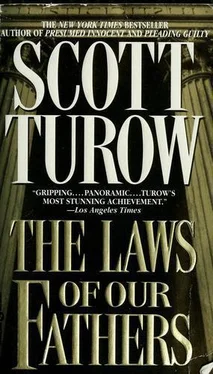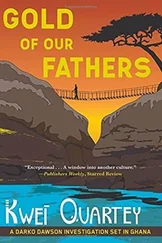Scott Turow - The Laws of our Fathers
Здесь есть возможность читать онлайн «Scott Turow - The Laws of our Fathers» весь текст электронной книги совершенно бесплатно (целиком полную версию без сокращений). В некоторых случаях можно слушать аудио, скачать через торрент в формате fb2 и присутствует краткое содержание. Жанр: Криминальный детектив, на английском языке. Описание произведения, (предисловие) а так же отзывы посетителей доступны на портале библиотеки ЛибКат.
- Название:The Laws of our Fathers
- Автор:
- Жанр:
- Год:неизвестен
- ISBN:нет данных
- Рейтинг книги:5 / 5. Голосов: 1
-
Избранное:Добавить в избранное
- Отзывы:
-
Ваша оценка:
- 100
- 1
- 2
- 3
- 4
- 5
The Laws of our Fathers: краткое содержание, описание и аннотация
Предлагаем к чтению аннотацию, описание, краткое содержание или предисловие (зависит от того, что написал сам автор книги «The Laws of our Fathers»). Если вы не нашли необходимую информацию о книге — напишите в комментариях, мы постараемся отыскать её.
The Laws of our Fathers — читать онлайн бесплатно полную книгу (весь текст) целиком
Ниже представлен текст книги, разбитый по страницам. Система сохранения места последней прочитанной страницы, позволяет с удобством читать онлайн бесплатно книгу «The Laws of our Fathers», без необходимости каждый раз заново искать на чём Вы остановились. Поставьте закладку, и сможете в любой момент перейти на страницу, на которой закончили чтение.
Интервал:
Закладка:
'No, no, it was in California. We lived in the same apartment building with the Eddgars. My boyfriend and I. He used to babysit for Nile. This is years ago. Twenty, at least. More. God, what a weird coincidence.' She shivers somewhat. It always takes her an instant to recognize what has gripped her so fiercely. Death. Dying. A dozen years ago, she had cancer of the breast, and anything that whispers about her own mortality can seize her with panic. 'Nile's father's here, isn't he? In the state legislature? Is that right?'
'State senator.' Marietta, who is beholden to her councilman for her job, goes to all the dinners, knows every party figure. 'District 39. Far Kindle, Greenwood Counties. Some kind of college professor seem like. And he got some funny name.'
'Loyell Eddgar,' says Sonny, and all three women laugh. Names, around here, are a never-ending subject. African names, Hispanic names, gang names. Aliases by the dozen. 'People just call him Eddgar. At least they used to. I think he was teaching at Easton at one point. That's how he ended up back here. He'd gone there before. When I knew him – in California? – he was a Maoist. God, those were crazy times,' adds Sonny and for a moment is held by the turmoil, the conflict of those years. It seems so far away and yet, like so much of life, underlies everything she is doing, like the soil from which all that's planted blooms. And now he's a state senator. 'Wow,' is what she wants to say. Lexicon of that bygone era. Wow. There have been some changes in her lifetime.
'I think June and he split up a long time ago,' Sonny adds. 'As far as I knew, she didn't even live around here.' The details have not really stuck. Her mind is porous when it comes to gossip. She will often make terrible gaffes.
'And which boyfriend is it you was living with?' asks Marietta. 'The one who writes the column now?'
Yet another dark look passes from the judge to her clerk, a plump brown woman of middle years who, as ever, makes a determined effort to pay no mind. Within the chambers, when there are no outsiders, there is an odd intimacy among the three women, especially when the conversation turns away from the law to home, men, children – the female realm with its mysterious equality. Yet Marietta knows no proper bounds. The way she puts it! As if Sonny had submitted a curriculum vitae of her love life. 1969-70: Seth Weissman, a. k. a. Michael Frain. 1970-72: various gentlemen of the Philippines. 1972-75: long dry spell. 1977-1992: Charles Brace. In truth this is information that Marietta has cobbled together with her own insistent curiosity, which Sonny always feels somewhat powerless to turn aside. Marietta has a husband of sorts, Raymen, but they have their troubles. For Marietta, therefore, this is the question of her life: What happens to love?
'What guy who writes the column?' Annie asks.
'Now haven't you heard that? Judge here used to live with that fella – what's his name, Judge?'
'Marietta, that was in the dark ages. I was a child.'
But the usual look of appreciation for Sonny's accomplishments has already come across Annie's tiny face.
'He's in the Tribune,' Marietta says. 'How'd you call it, what he writes, Judge?'
'Lifestyle, I suppose. The sixties survivor point of view.'
'Right. You know how funny people can be in what they do.'
‘I think the column is called "The Survivor's Guide." Michael Frain,' says Sonny. 'He writes under the name of Michael Frain. He's syndicated,' she adds and then feels that she's fallen into
Marietta's trap and is actually boasting about this boy who came and went from her life before Noah set to sea.
'Oh, I read that,' says Annie. 'He make me laugh. He was your boyfriend?'
'Momentarily. But his name isn't really Michael Frain. It's Seth Weissman. Michael Frain is a pen name. The whole thing is somewhat confusing. We knew somebody named Michael Frain at that point. He lived in the building, too.'
'With Nile Eddgar and them?'
'Right. Nile and Eddgar and June in one apartment. Seth and me in another. And then Michael Frain. Other people, too, obviously.'
'Sounds like some commune,'says Marietta, and Sonny cannot contain herself, she laughs aloud. Sometimes Marietta might just as well say it: You white folks are strictly crazy. Yet there was some aspect of happy communalism in those years – young, before the walls were up, the boundaries drawn. Seth's best friend, who was in law school, was always in their apartment, Hobie something, a big, funny guy, black, a wild character.
Annie has looked up from the files and studies the judge, trying to comprehend all of this – the names, the relations. She has delicate looks, her eyes smallish against a broad flange of cheek. Sonny repeats herself.
'Michael wasn't my boyfriend. My boyfriend's name was Seth. He's the one who writes the column. But the pen name he uses is Michael Frain.'
Marietta, with a big-city look of mistrust, finally speaks the lingering question. 'So what happened to Michael Frain?'
‘I haven't the foggiest,' says Sonny. 'God's truth. Seth and I were past tense by then.' Not that she hasn't wondered. A sudden stab of curiosity sometimes reaches her when she sees the name, the picture at the heading of the column. How did Seth become Michael? Where did Michael go? The questions, even now, make her uneasy.
This talk of Seth, of newspapers, brings Sonny's mind again to June Eddgar and the murder. There will be reporters in the courtroom. A white lady murdered in a drive-by. Mother of a probation officer. A prominent politician's ex. Lubitsch is right. It's a doozy.
'I'd love to keep this case,' she says to Marietta. It's not really the attention that excites her. Since all new judges face a yes-no retention vote six years after appointment, the accepted wisdom is to avoid publicity, so that the voters will have no reason to reject you. It's more the past that seems somehow alluring. The unexcavated remains of her own existence. Something back there, perhaps merely her youth, inspires curiosity, the vaguest thrill to think of the distances she's moved.
'Keep it,' Marietta answers. 'Chief Judge don't like you to transfer cases anyway.' The judges – lawyers, pols, bureaucrats by training – are often schemers, inclined to dump demanding or controversial cases on colleagues with less clout. As a result, the Chief, Brendan Tuohey, has erected strict rules. The mere thought of Tuohey and his edicts makes Sonny uneasy. Raised without a father at home, she inevitably finds men of a certain age formidable. And Tuohey, a crafty pol whose probity has long been open to question, has never cared for Sonny or the Reform Commission that forced her into his domain. To her face, he is unfailingly polite, even courtly, but Sandy Stern, Sonny's old friend and occasional mentor, has gone so far as to suggest that Tuohey placed her in the Criminal Division, in spite of her limited judicial experience – a year in the matrimonial division, a few months in the criminal branch courts – in the hope she would fail.
'Well, I have to put something on the record. About knowing June. When's this case up for the bond hearing? Now?'
It's nearly 2:00. There will be no bail, of course. The gang defendants are invariably on probation or parole, and bond, under the law, is not permitted. Sonny asks about Hardcore's probation status and Annie sets off to the outer office to get the answer from Marietta's computer console. Marietta continues racking the files from the morning call on a stainless-steel cart for transport back to the clerk's office.
'Hardcore has himself a probation officer.' Lubitsch, having thrown open the door a bit too forcefully, is on the threshold, with Annie beside him. Beaming, virtually luminous with secret knowledge, the policeman engages in a stage pause until Sonny beckons with a hand.
Читать дальшеИнтервал:
Закладка:
Похожие книги на «The Laws of our Fathers»
Представляем Вашему вниманию похожие книги на «The Laws of our Fathers» списком для выбора. Мы отобрали схожую по названию и смыслу литературу в надежде предоставить читателям больше вариантов отыскать новые, интересные, ещё непрочитанные произведения.
Обсуждение, отзывы о книге «The Laws of our Fathers» и просто собственные мнения читателей. Оставьте ваши комментарии, напишите, что Вы думаете о произведении, его смысле или главных героях. Укажите что конкретно понравилось, а что нет, и почему Вы так считаете.












